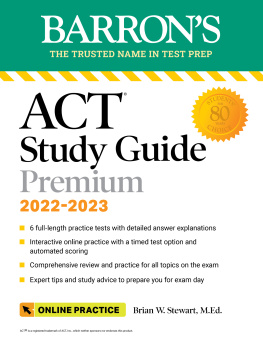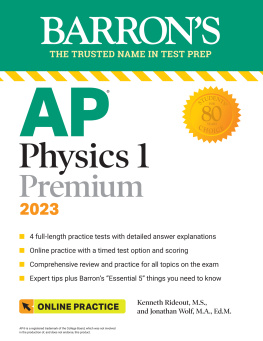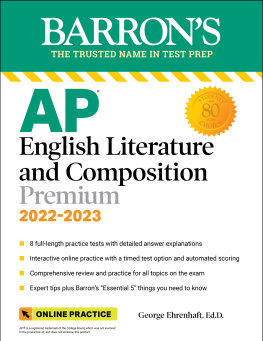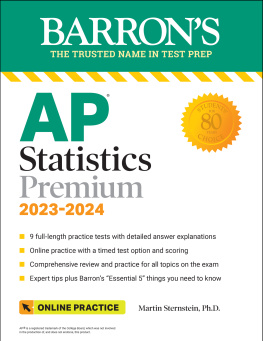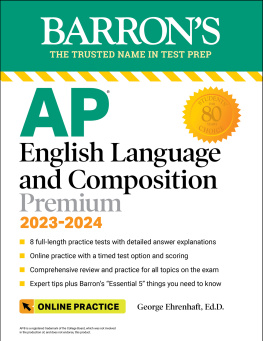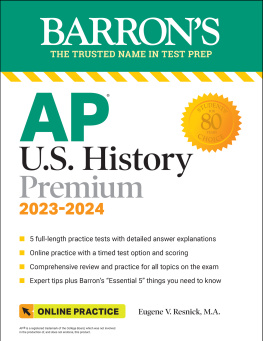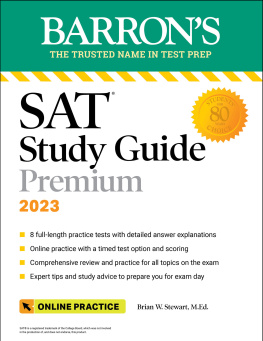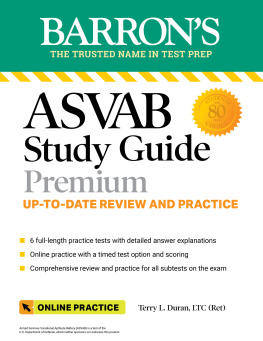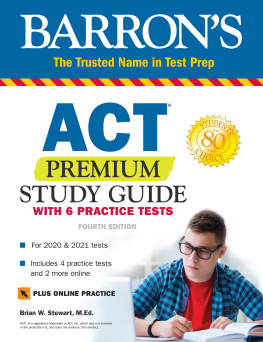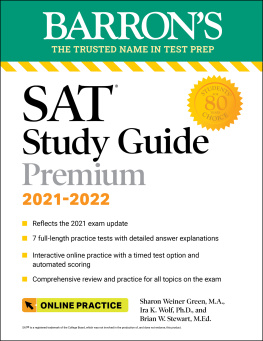

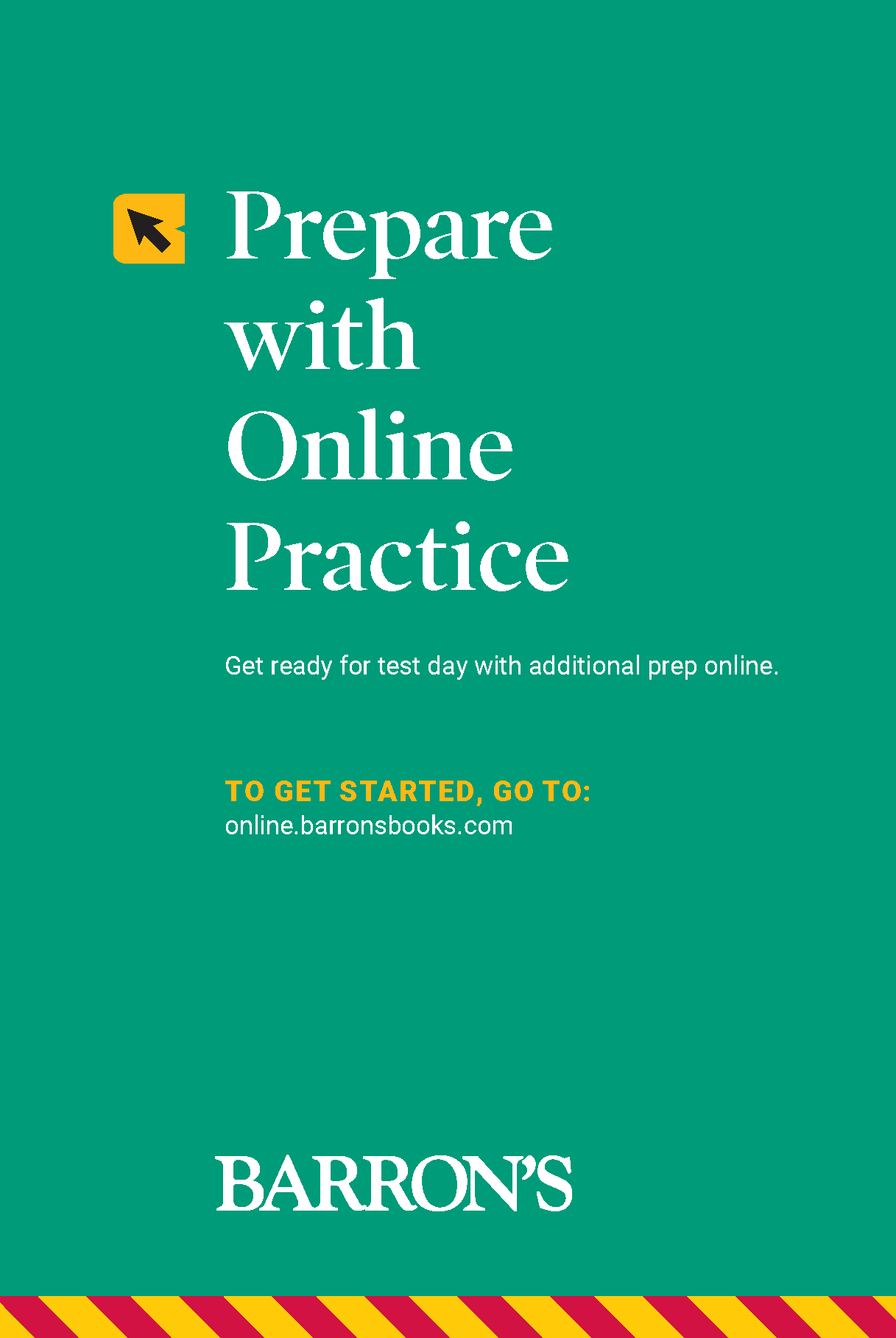
Dedication
Dedicated to my wife Caitlin, my son Andrew, and my daughter Eloisewithout your love and support, this book would not have been possible. I would like to especially thank my mom, my dad, Andy, Mitchell, Alaina, Michal, and Andrew for their help with this undertaking. I am grateful to everyone at Barrons, especially my editor Kristen Girardi.
Thanks so much to all of my students over the yearsI have learned far more from you than you have learned from me.
About the Author
Brian W. Stewart is the founder and President of BWS Education Consulting, Inc., a boutique tutoring and test preparation company based in Columbus, Ohio. He has worked with thousands of students to help them improve their test scores and earn admission to selective schools. Brian is a graduate of Princeton University (A.B.) and The Ohio State University (M.Ed.). You can connect with Brian at www.bwseducationconsulting.com.

Copyright 2021, 2019, 2018, 2016, 2014 by Kaplan, Inc., d/b/a Barrons Educational Series, Inc.
All rights reserved under International and Pan-American Copyright Conventions. By payment of the required fees, you have been granted the non-exclusive, non-transferable right to access and read the text of this eBook on screen. No part of this text may be reproduced, transmitted, downloaded, decompiled, reverse engineered, or stored in or introduced into any information storage and retrieval system, in any form or by any means, whether electronic or mechanical, now known or hereinafter invented, without the express written permission of the publisher.
Published by Kaplan, Inc., d/b/a Barrons Educational Series::
750 Third Avenue
New York, NY 10017
www.barronseduc.com
ISBN: 978-1-5062-8224-4
10 9 8 7 6 5 4 3 2 1
Kaplan, Inc. d/b/a Barrons Educational Series print books are available at special quantity discounts to use for sales promotions, employee premiums, or educational purposes. For more information or to purchase books, call the Simon & Schuster special sales department at 866-506-1949
Contents
What Is the ACT?
The ACT is a test accepted by colleges and universities in the United States for consideration in the admissions process. It is a test of the general skills you have developed over your academic career. It is approximately four hours long and is offered on seven Saturdays throughout the year. For a list of upcoming dates and registration deadlines, go to:
www.actstudent.org/regist/dates.html
The ACT is made up of the following sections:
- English, 45 minutes, 75 questionstest of grammar, usage, and rhetorical skills
- Math, 60 minutes, 60 questionstest of problem-solving skills in algebra, geometry, and trigonometry
- Reading, 35 minutes, 40 questionstest of reading comprehension skills
- Science, 35 minutes, 40 questionstest of scientific analytical and reasoning skills
- Writing, 40 minutes, 1 essay question (This section is optional.)
TIP
The test sections come in alphabetical order.
There is a 10-minute break between the Math and Reading sections, and a 5-minute break between the Science and Writing sections.
How Do I Sign Up?
It is easiest to sign up online, although there are a variety of options given on the ACT website:
www.actstudent.org/regist/
If you receive extended time or other special accommodations on school tests, be sure to look into extended time and/or accommodations on the ACT. The ACT has a process to ensure that those who deserve extended time receive it. Find the latest details on what services may apply to your situation here:
www.actstudent.org/regist/disab/
The ACT also allows students whose families are experiencing economic hardship to take the test up to four times at no cost. You will need to ask your guidance counselor for a Fee Waiver Form. The most updated information on ACT Fees can be found here:
www.act.org/the-act/fees
When Should I Take It?
Most students take the test in their Junior year of high school since they will have completed most of the math they will need, but you can certainly take it earlier if you are interested in seeing where you stand. Unless a college specifically requires that you submit all of your test scores from the ACT (which is quite rare), you will only send in the results from the test date(s) you choose. In addition to all the test dates during the school year, the ACT has recently added a July test date. Check out the ACT test dates to see what works well with your schedule, and take the ACT when you will have adequate time to be well-rested and well-prepared.
Where Should I Take It?
The ACT is offered at a wide variety of schools and universities throughout the United States and around the world. They make it relatively easy for you to take the test at a location not too far away. In fact, even if you are in prison, the ACT allows for special accommodations for you to be tested. There are four things most students should consider when picking a location:
- Register early to ensure you dont get closed out of a location that appeals to you.
- High schools often have larger desks than colleges, which makes it easier to fully open your test booklet instead of only being able to have a single page open at a time.
- If you are someone who likes to take the test in familiar surroundings, see if the test is offered at your high school. If it is not, you may want to check out your test location before the actual ACT so you can be calmer on test day.
- If you find that being around people you know makes you feel more competitive stress during the ACT, take the test at a location where you wont know many people.
How Is It Scored?
There is NO GUESSING PENALTY on the ACT, so be certain that you do not leave any answer blank!
The ACT is scored on a curved scale from 136, with 1 being terrible and 36 perfect. The average test taker scores around 2122. Each of the four required sectionsEnglish, Math, Reading, and Scienceis scored from 136. The ACT adjusts the curve with each test to ensure that the results from one test indicate the same level of ability as the results from another. The overall composite score is found by taking a simple average of the four section scores and is rounded up if applicable. The ACT Writing section is reported separately on the score report, but it does not affect the overall composite score.
Should I Take the Writing Test?
If you dont know where you are planning to apply to school, go ahead and take the Writing Test so you can keep your options open. If you know where you will be applying to school, check out their writing test requirements by calling the admissions office or checking the admissions website.
How Do I Receive My Scores?
If you register online, you will typically be able to access your score report approximately three weeks after your test date. If you choose, you can also have your scores mailed to you.
Next page
